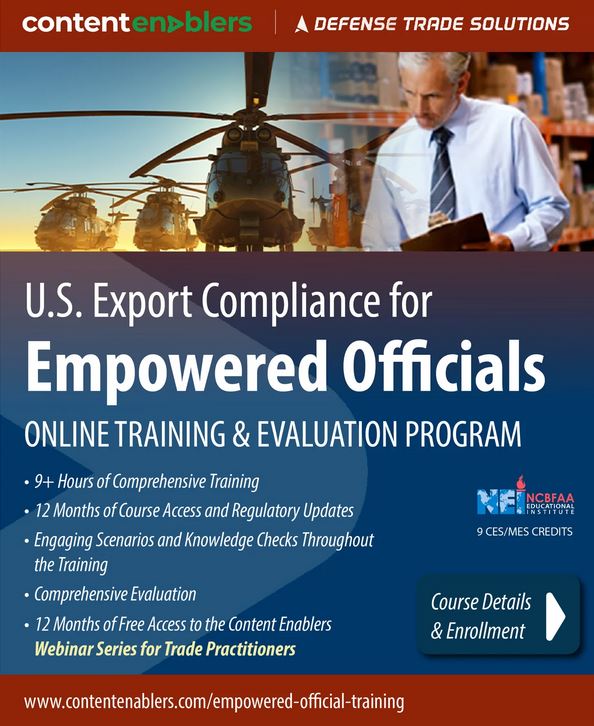ITAR Empowered Officials: Essential Training Requirements for Compliance and Success

At Defense Trade Solutions, we understand that maintaining compliance with the International Traffic in Arms Regulations (ITAR) is paramount for companies involved in the defense and aerospace sectors. A critical component of ITAR compliance is the designation and training of Empowered Officials (EOs). These individuals play a pivotal role in ensuring that their organizations adhere to ITAR’s stringent requirements. This blog post outlines the essential training requirements for ITAR Empowered Officials, helping you to equip your EOs with the knowledge and skills necessary for effective compliance.
Who is an ITAR Empowered Official?
An ITAR Empowered Official is an individual authorized by a company to oversee ITAR compliance. According to ITAR §120.25, an EO must:
- Be a U.S. Person: The EO must be a U.S. citizen or permanent resident.
- Have Legal Authority: The EO must have the authority to sign and bind the company in regulatory compliance matters.
- Understand ITAR Requirements: The EO must possess a thorough understanding of ITAR regulations and the company’s obligations under these regulations.
Why Training is Crucial
Training is essential for Empowered Officials because they are responsible for the following key tasks:
- Ensuring the company complies with all ITAR requirements.
- Overseeing the export and import of defense articles and services.
- Managing export license applications and maintaining records.
- Implementing and enforcing internal compliance programs.
- Communicating with the Directorate of Defense Trade Controls (DDTC).
Given these responsibilities, comprehensive training ensures that EOs are well-prepared to handle the complexities of ITAR compliance.
Essential Training Requirements
- Fundamentals of ITAR
Overview of ITAR: Training should start with an in-depth overview of ITAR, including its purpose, scope, and key definitions.
Regulated Articles and Services: EOs should understand what constitutes defense articles and services, including technical data and defense services covered under ITAR.
- Roles and Responsibilities of an EO
Authority and Accountability: Clarify the legal authority and accountability of an EO, emphasizing their role in regulatory compliance and the consequences of non-compliance.
Internal Compliance Program: EOs should be trained on how to develop, implement, and maintain an effective ITAR compliance program within their organization.
- Export Control Basics
Export Licensing: Detailed training on the export licensing process, including how to apply for licenses, what information is required, and how to ensure applications are complete and accurate.
Exemptions and Exceptions: Understanding the various ITAR exemptions and exceptions and how to apply them correctly.
- Technical Data and Security
Classifying Technical Data: Training on how to classify technical data and ensure it is properly protected and controlled.
Safeguarding Information: Best practices for securing ITAR-controlled technical data and preventing unauthorized access.
- Record-Keeping and Reporting
Documentation Requirements: EOs must be trained on the record-keeping requirements under ITAR, including what records need to be maintained and for how long.
Reporting Obligations: Understanding the reporting requirements, such as voluntary disclosures and annual reports to the DDTC.
- Compliance Audits and Assessments
Conducting Internal Audits: Training on how to conduct internal compliance audits to identify and rectify potential issues.
External Audits: Preparing for external audits by regulatory bodies, including what to expect and how to ensure a smooth audit process.
- Continuous Education and Updates
Staying Current with Regulations: EOs should be encouraged to participate in ongoing education and stay updated with changes to ITAR regulations and policies.
Industry Best Practices: Sharing industry best practices and learning from case studies of compliance successes and failures.
Best Practices for ITAR EO Training
- Tailored Training Programs: Develop training programs tailored to the specific needs of your company and the experience level of your EOs.
- Interactive Learning: Utilize interactive training methods, such as workshops, simulations, and case studies, to enhance understanding and retention.
- Expert Instructors: Engage instructors with extensive experience in ITAR compliance and real-world industry knowledge.
- Regular Refresher Courses: Implement regular refresher courses to keep EOs updated on regulatory changes and reinforce key compliance concepts.
- Assessment and Certification: Include assessments to evaluate understanding and provide certification upon successful completion of the training program.
Conclusion
Training your ITAR Empowered Officials is a crucial step in ensuring compliance and safeguarding your organization against regulatory risks. At Defense Trade Solutions, we are committed to helping you develop and implement comprehensive training programs that empower your EOs to succeed in their roles. By investing in the proper training, you can enhance your compliance efforts, protect your organization, and contribute to the secure and lawful trade of defense articles and services.
For more information on ITAR EO training programs or to schedule a consultation with our compliance experts, contact Defense Trade Solutions today. Together, we can build a strong foundation for ITAR compliance and secure your company’s position in the defense industry.
Comments